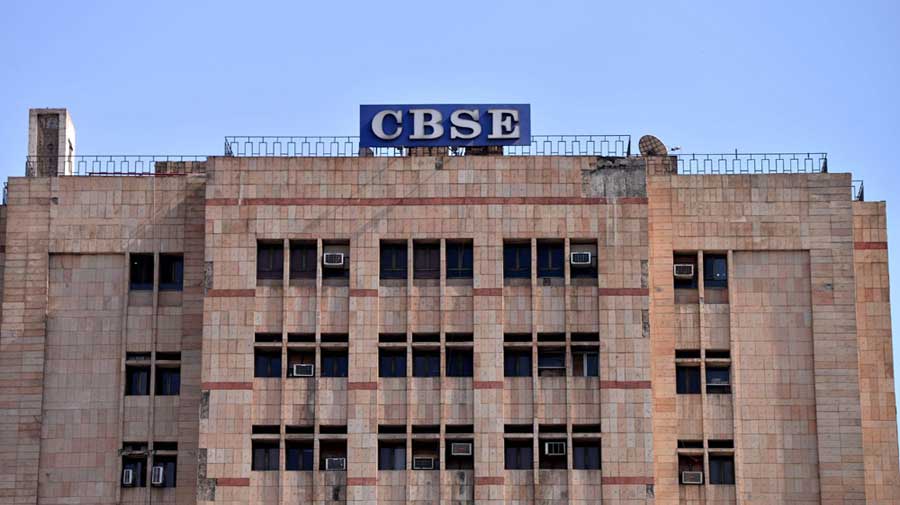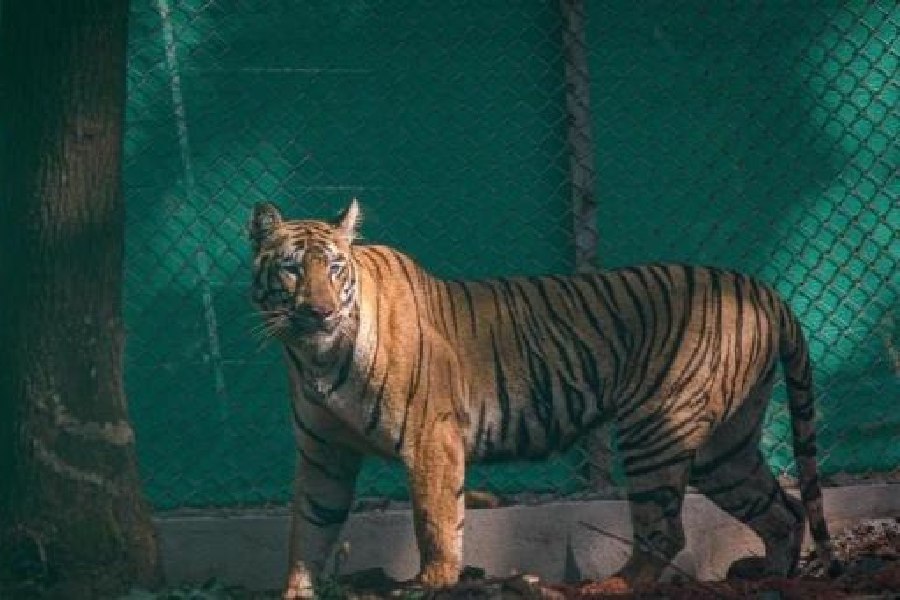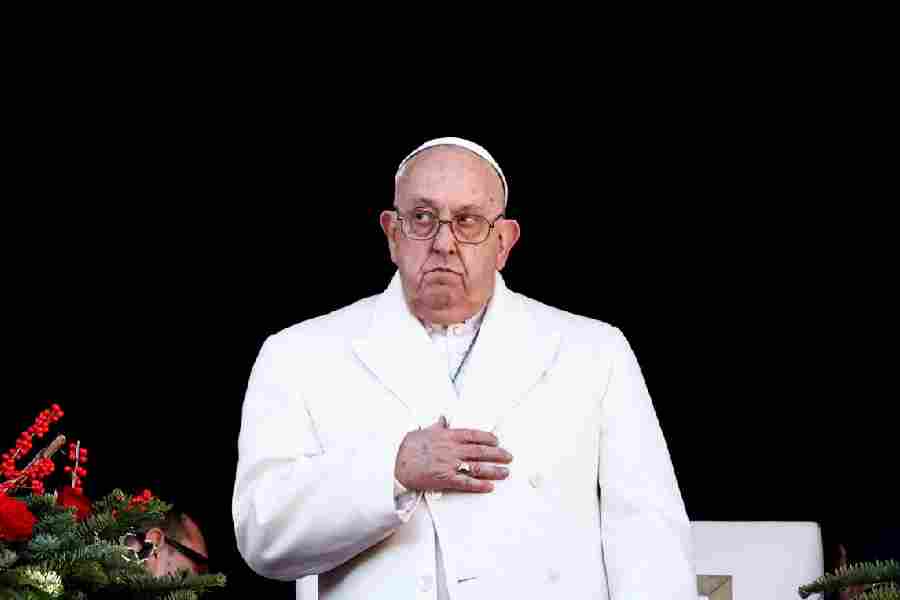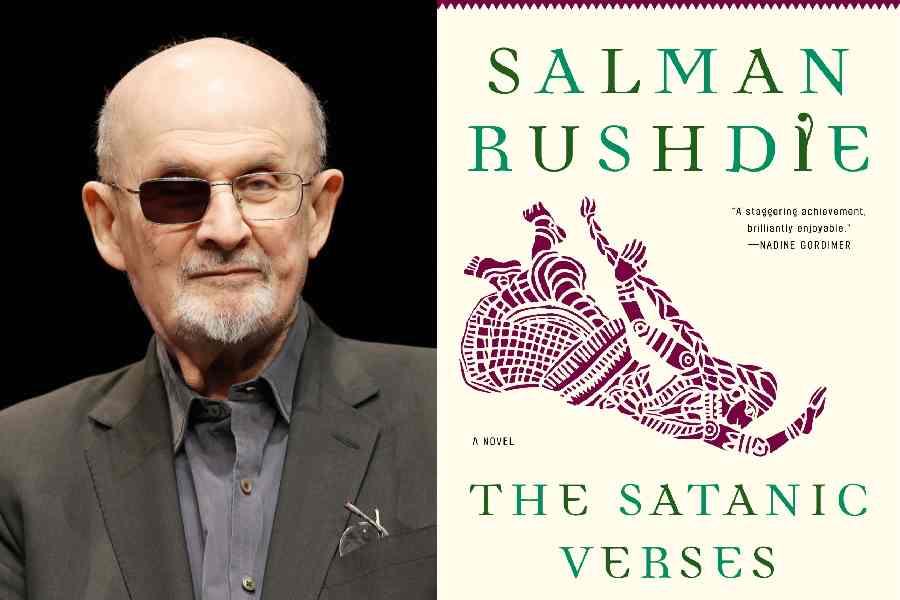D for Democratic rights, Diversity, Demonetisation... and Deletion.
The Central Board of Secondary Education has removed the first three topics from its syllabuses for Classes IX to XII this academic year (2020-21), along with chapters on federalism, nationalism, gender-religion-caste, food security, the Partition and the goods and services tax.
This is part of the board’s government-advised exercise to reduce its syllabuses for various subjects by up to 30 per cent, on the ground of the need to reduce the students’ burden at a time the Covid-19 crisis has hit schooling.
However, the government’s critics have underlined that many of the axed topics tend to promote knowledge and ideas that are unfriendly to the RSS-BJP ideology.
Schoolteachers and principals have, however, largely welcomed the move and argued there’s a lot of overlap between syllabuses in different subjects and classes, which ensures the deleted chapters would not go entirely untaught through a student’s school life.
Human resource development minister Ramesh Pokhriyal had on Tuesday tweeted that his ministry had advised the CBSE to “reduce course load for the students of Class 9th to 12th”.
Sociologist Andre Beteille disagreed with the idea of reducing the syllabus.
“I don’t think that cutting down on the syllabus is a good thing,” he said. “If necessary, the examinations can be postponed or cancelled (next year) and the students can be graded under an alternative mechanism.”
The removal of the chapters on federalism, secularism and nationalism from the Class XI political science syllabus has attracted the most criticism on social media. In a tweet, CPM leader Sitaram Yechury has condemned the move.
“Using the pandemic, Modi government is deleting sections dealing with India’s diversity, plurality, democracy etc that uphold our constitutional values from the higher secondary syllabus,” Yechury wrote.
Bengal chief minister Mamata Banerjee tweeted: “Shocked to know that the Central Govt has dropped topics like Citizenship, Federalism, Secularism & Partition in the name of reducing CBSE course during #COVIDCrisis. We strongly object to this & appeal @HRDMinistry, GoI to ensure these vital lessons aren’t curtailed at any cost.”
The CBSE later issued a clarification saying the reduction merely meant that no questions would be asked in exams on the deleted chapters — but teachers would be encouraged to teach them.
It asserted that the reductions were a one-time measure for the 2020-21 session and were meant to “reduce examination stress of students due to the prevailing health emergency situation”.
However, Amarchand, a political science teacher at a Delhi government school, said it was very unlikely that the teachers and students would expend much effort on chapters that the exams would not cover.
Ujjwal Singh, a political science professor at Delhi University, however, said the changes were fine.
“There are 10 topics and you have to remove 3. All chapters are fundamental, but the most important topics like liberty, justice and equality have been kept in the Class XI syllabus,” Singh said.
Educationist Usha Ram said the removal of the deleted topics would not affect the children’s education.
“Most of these concepts are repeated in different classes; so the removal of a chapter from a particular class does not mean the students will have no exposure to it,” she said.
But Amarchand said the topics of federalism, secularism and nationalism — deleted from the Class XI political science syllabus — have not been covered as “comprehensively” in previous classes.
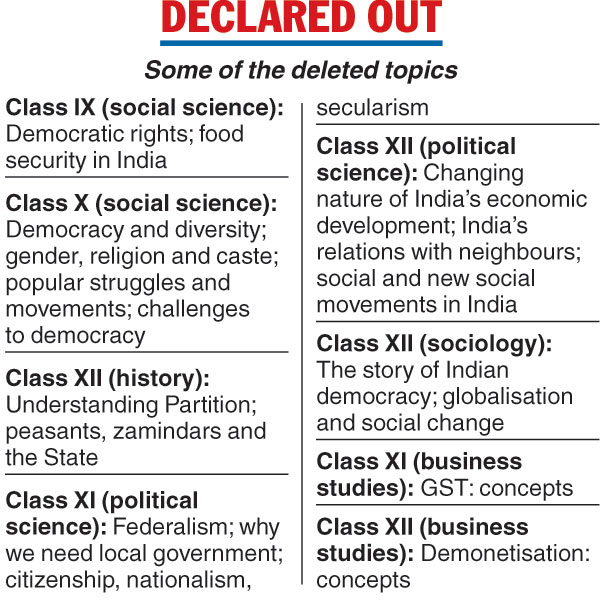
Kiran Mehta, dean (academics) at Mother Mary School, Delhi, said the syllabus reductions reflected a balanced approach.
“Holding physical classes will be difficult for the next few months, it seems, so this reduction was necessary. But this is only temporary: these chapters will be restored when the situation becomes normal,” Mehta said.
A CBSE official said that before deciding on the reductions, the board had consulted top educationists and principals as well as the NCERT, the country’s apex academic body that designs school curricula.
A DU teacher who wished to remain anonymous, however, said that students who join professional courses after Class XII get to study the social sciences and economics only at school. Such students’ worldview about political systems and democracy might remain inadequate if they aren’t taught the chapters deleted by the CBSE.
“Where will these students get to read about democracy, diversity, caste, religion and the Partition once they enrol in MBBS or BTech courses?” he said.
“There’s a need for more content on the social sciences and the humanities so that children become more responsible citizens.”
Ruchi Garg, a schoolteacher, said the chapters on the demonetisation and the GST may have been removed from business studies but remained in the Class XII economics syllabus.
However, not every student who has business studies also reads economics.
The CBSE clarification, issued by board secretary Anurag Tripathi, said the schools had been directed to follow an alternative academic calendar prepared by the NCERT with online classes in mind.
It said “the topics being mentioned as dropped” are covered in the “alternative academic calendar of NCERT”.

